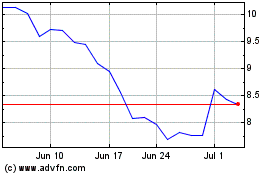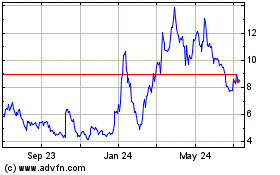Sanofi Teams Up With U.S. Army on Zika Vaccine
July 06 2016 - 1:40AM
Dow Jones News
Sanofi SA has formed a partnership with the U.S. Army to expand
research and development of an experimental Zika vaccine that has
shown promise in early laboratory studies and is among a few
candidates expected to be tested on humans in the coming
months.
At least 15 companies and entities, including Sanofi, are racing
to develop vaccines against the Zika virus, which is behind an
epidemic in the Americas that the World Health Organization says
constitutes a public health emergency because the virus is linked
to birth defects in multiple countries.
The experimental vaccine developed by scientists at the Walter
Reed Army Institute of Research in Silver Spring, Md., and now to
be advanced by Sanofi, is one of the furthest along.
Made from a whole virus that has been killed, or inactivated, it
is based on a technology that has been used on vaccines that have
been licensed against viruses related to Zika, such as Japanese
encephalitis, said Col. Stephen Thomas, the institute's Zika
program lead. "It was a playbook that we've run before," he said.
The technology has also been used for years for flu, polio and
other vaccines.
The experimental Zika vaccine will be tested on humans in a
Phase I clinical trial starting in October that will be funded by
the U.S. government, said Col. Nelson Michael, co-lead of the
institute's Zika program.
A single dose of the vaccine developed by the Army institute
fully protected mice in a study published last week in the journal
Nature, a finding that suggests an effective vaccine against Zika
can be made. "The protection was striking," said Dan Barouch,
professor of medicine at Beth Israel Deaconess Medical Center and
Harvard Medical School, who led the study. The study examined the
Army vaccine as well as another that Dr. Barouch's lab
developed.
The experimental vaccine developed by the Army institute is the
second that Sanofi is pursuing for Zika. The Paris-based company is
also conducting preclinical studies on a vaccine that is based on a
technology it used to develop treatments against dengue and
Japanese encephalitis. But that vaccine will take longer to develop
and get to market than other approaches, Sanofi said. The
technology is different from the one employed by the Army institute
for its Zika vaccine.
"In addition to exploring our own vaccine technology used in our
new dengue fever vaccine, we are looking at other pathways to get a
Zika vaccine into the clinic as soon as possible," said David Loew,
executive vice president of Sanofi Pasteur, the French drugmaker's
vaccine unit.
Under the agreement, the Army will transfer its technology for
the vaccine candidate to Sanofi Pasteur, which will take on
advanced clinical development, develop a manufacturing process, and
handle other matters related to testing, regulatory approval, and
production of the vaccine.
Researchers and companies are racing to get a vaccine to market
as quickly as possible—though they caution it is likely to take
three years or more before that happens. While the virus makes most
people only mildly ill, if it makes them sick at all, it can cause
severe brain damage in the fetuses and infants of women who are
infected during their pregnancies. In adults, it has been linked to
an increase in cases of Guillain-Barre syndrome, a rare immune
disorder.
The WHO says that 61 countries and territories have reported
ongoing transmission of the virus, and 12 countries and territories
have reported Zika-related birth defects.
Inovio Pharmaceuticals Inc. and GeneOne Life Science Inc., a
South Korean biopharmaceutical company, said last month that they
plan to start a human clinical trial of a vaccine candidate in the
coming weeks. The National Institute of Allergy and Infectious
Diseases, part of the U.S. National Institutes of Health, has said
it would start human clinical trials on a vaccine candidate by
September. The Biomedical Advanced Research and Development
Authority, a division of the U.S. Department of Health and Human
Services, is developing a Zika vaccine with Brazil's Butantan
Institute.
Vaccine developers have numerous questions to address: how much
of a market there will be for a vaccine against an infection that
generally produces mild, short-lived symptoms; whether and how to
protect pregnant women; and possible cross-reactions with related
viruses such as dengue. Scientists say their hope is to develop a
vaccine that would be given regularly to women when they are young,
so they develop immunity before their childbearing years.
A vaccine containing killed virus is potentially a safer bet for
pregnant women, who are urged to avoid certain types of shots, said
the Army institute's Dr. Thomas. "A killed vaccine has an
inherently superior safety profile," he said.
Write to Betsy McKay at betsy.mckay@wsj.com and Noemie Bisserbe
at noemie.bisserbe@wsj.com
(END) Dow Jones Newswires
July 06, 2016 01:25 ET (05:25 GMT)
Copyright (c) 2016 Dow Jones & Company, Inc.
Inovio Pharmaceuticals (NASDAQ:INO)
Historical Stock Chart
From Mar 2024 to Apr 2024

Inovio Pharmaceuticals (NASDAQ:INO)
Historical Stock Chart
From Apr 2023 to Apr 2024
